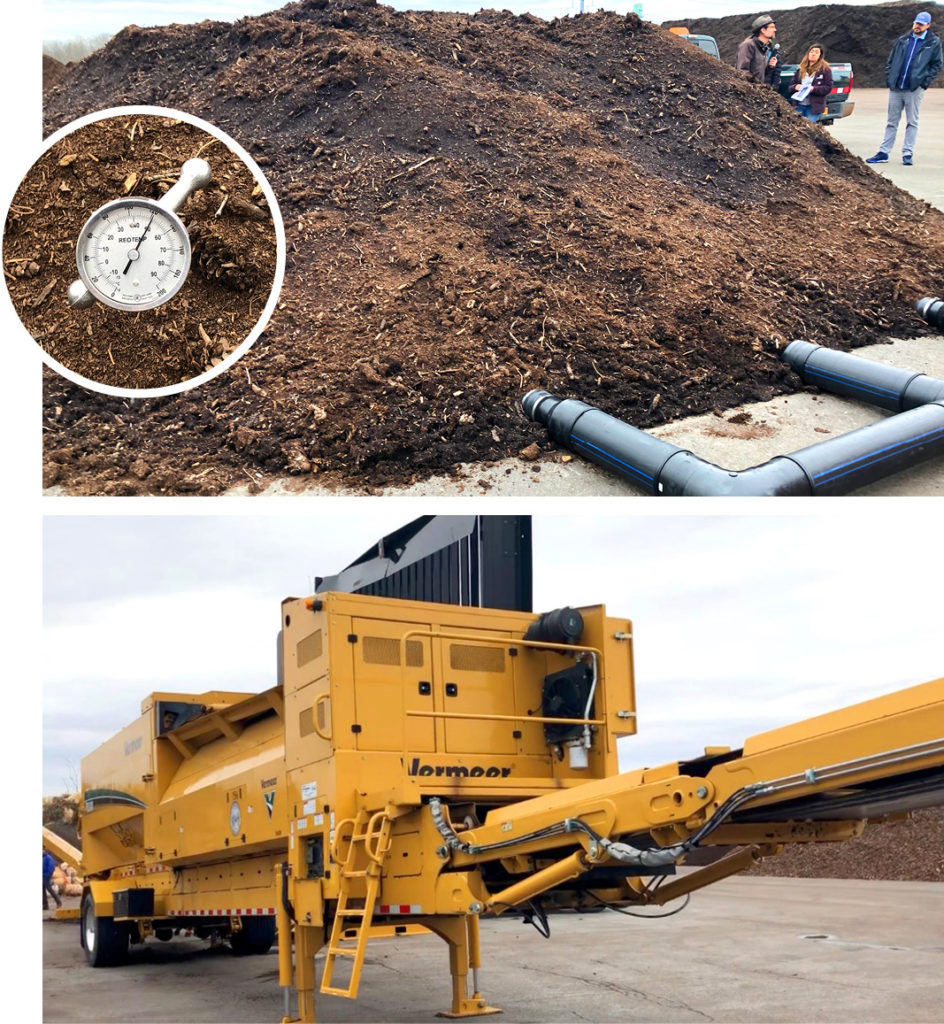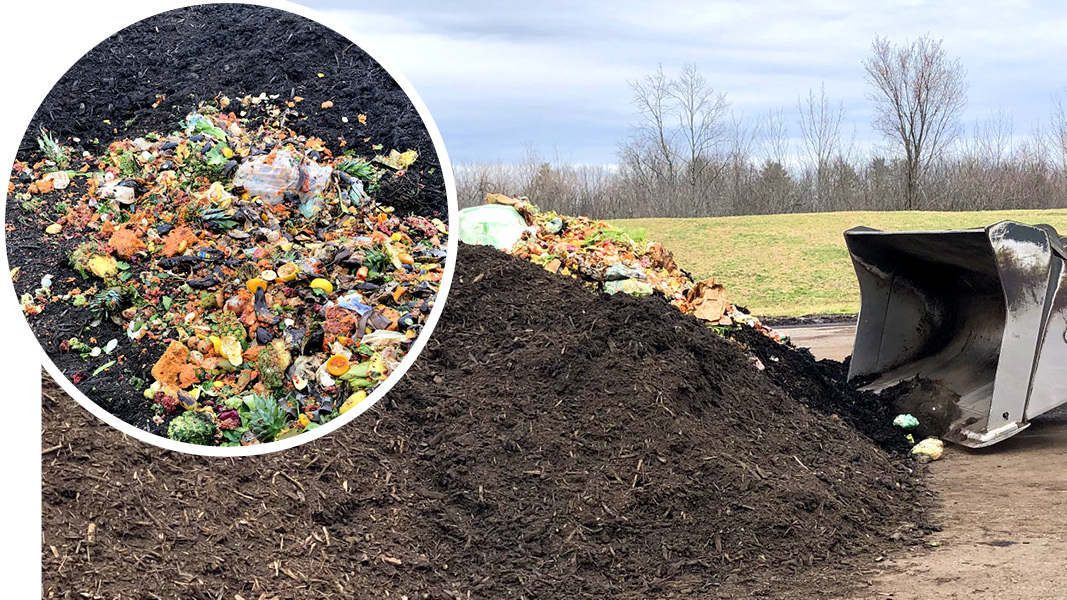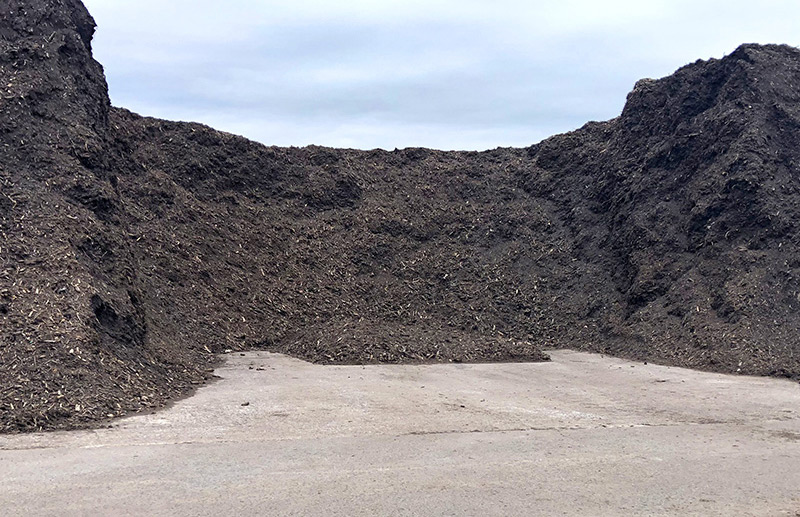Top: Food waste is unloaded on a “sponge” of ground yard trimmings and mixed with a loader bucket.
The Town of Bethlehem, New York, about 10 miles south of Albany, the state capital, began accepting loads of commercial and residential food waste at its yard trimmings composting facility in late 2019, but very recently expanded this program. The site, established over 20 years ago, has been composting yard trimmings in turned windrows. It receives upwards of 70,000 cubic yards/year of leaves, brush, wood waste and grass clippings, and according to annual reports from the New York State Department of Environmental Conservation, it is the largest composting facility in the Capital Region.
In early April, the town’s Recycling & Composting Department held a ribbon cutting for its new aerated static pile (ASP) system designed to compost the food waste. “The new pad is about 3 acres,” says Dan Lilkas-Rain, the Town of Bethlehem’s Recycling Coordinator. “Our site is permitted to take up to 5,000 cy/year [2,500 tons] of food scraps. We are currently receiving a few tons a week, but we are just getting started.” The tipping fee for food waste is $15/cubic yard (cy); the fee for yard trimmings is $10/cy. The entire facility sits on about 8 acres of asphalt. The Bethlehem facility is currently the only municipal food waste composting facility in the Capital Region, but has been giving tours and offering advice and encouragement to other municipalities that are looking to start composting food waste, just like Ulster County in the Hudson Valley did for Bethlehem several years ago.
Loads of food waste are brought in by local haulers, primarily FoodScraps360; conversations with several others are taking place as the program expands. FoodScraps360 services residential curbside and drop-off customers in Bethlehem and the greater region including Albany, Schenectady and Troy, as well as commercial and institutional generators such as local businesses and each school in the Bethlehem Central School District. The Town of Bethlehem plans to set up one or more food waste drop-off areas for its residents. Source separated materials accepted include all food waste, compostable liner bags (but no other plastics), and compostable paper and cardboard. Incoming loads are tipped onto a “sponge” of ground yard trimmings, and then mixed in a 3:1 ratio or greater of yard trimmings to food. The blended feedstocks are staged in a “pre-composting” static pile and then moved to the ASP pad and unloaded onto perforated aeration pipes covered with a ground wood “plenum layer” typically comprised of overs screened out by the half-inch trommel screen. Each pile is 80-feet long, 27-feet wide and 7.5-feet tall. Once constructed, it is topped with a 12-inch layer of leaf compost to serve as a “biofilter layer.” Peter Moon with O2 Compost Systems engineered the ASP system.

Aerated static pile configuration for composting food waste (top). The Vermeer trommel screen (above) was recently equipped with a wind sifter to remove contamination. Photos by Nora Goldstein
“We use a 1.5 HP blower motor, and for the first two to four days, cycle the blower on and off every 30 minutes,” explains Lilkas-Rain. “We start out at 75 seconds of air/cycle, and for the first pile we built, it took 2 to 2.5 days to get to the 131°F range. After three to five days, we increase the intensity and frequency of air, and then keep the pile temperature at 110°F to 120°F for the remaining 21 to 23 days of active composting. The material then cures for 30 to 60 days, and is screened through a Vermeer trommel, which was recently equipped with a wind sifter to remove any contaminants like film plastic. We have enough pipe and aeration blowers to have five ASP zones.”
When designing the food waste composting operation, an alternative area for tipping loads of food waste on windy days was incorporated as the site is in an open, flat area. A space is carved out in a yard trimmings windrow, which blocks the wind. A bed of ground yard trimmings is laid down and food waste is unloaded onto it. Materials are mixed and then taken to the pre-composting staging pile.
Compost sales at the facility are robust. In 2021, the Town of Bethlehem earned about $160,000 in bulk compost sales revenues. Screened compost and mulch are sold for $17 to $26/cy; unscreened leaf compost is $15 to $18/cy. The food waste compost is sold in 1.0 cubic foot bags under the name Full Circle Food Scraps, described on the Town’s website as “Enhanced Triple-Screened Compost …. with an added nutrient boost from local food scraps.”














